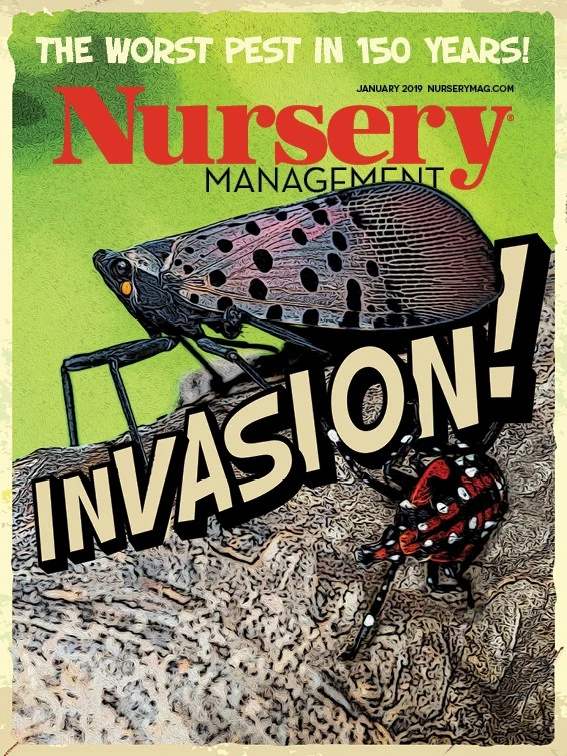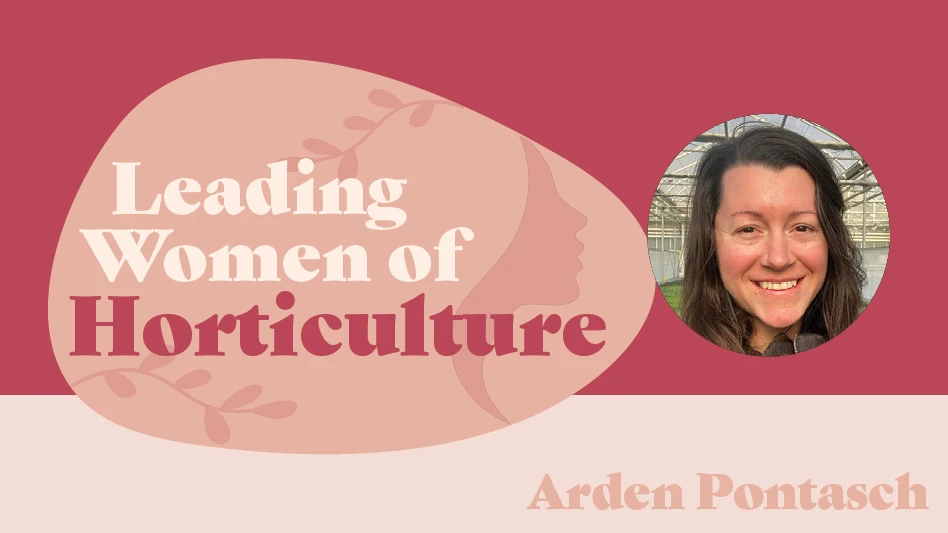
Photo courtesy of Angela Treadwell-Palmer

For some kids, their first pet is a fish, a turtle or a furry four-legged friend. For Angela Treadwell Palmer it was a pet moss. Yes, you are reading that correctly. When she was 4 years old, she had a pet moss that she carried around all summer, and to this day is still teased by family about it. Although she grew up in a family of non-gardeners, she always felt at home in the forest because of the big trees and, of course, all the moss. During her freshman year at college she fell in love with a Norfolk Island pine that doubled as her Christmas tree. She named him George.
Angela gained her Bachelor of Science in Plant Science from the University of Delaware with concentrations in Ornamental Horticulture and Landscape Design. Her first job in horticulture was not a glamourous one. She pruned Christmas trees, a job that she described as “wretched.” And between classes at the university, she worked at a nursery doing everything from unloading trucks to watering nursery stock and pruning. When she graduated from college, her first job was at The Conard-Pyle Company working in research and development. And it was there where she named and got to introduce a game changer for the horticulture world, the Knock Out Rose.
The Knock Out roses were in trials for two growing seasons in two locations, and Angela and the rest of the team at Conard-Pyle knew it was something special in terms of disease resistance after the end of the second year, she recalls.
“It had no black spot. At that point, we entered it as a shrub rose into the AARS trials. It was one of the first shrubs to win an award,” she says. “In the 90s consumers didn't really buy single petaled roses, and they certainly did not want to spray them, so it took some clever marketing to get even the growers to trial it.
“I remember walking around the AARS meeting in California with a bundle of super thorny Knock Out flower stems in my arms, showing them to every grower and telling them that this was truly the first rose ever in the Conard-Pyle trials to get no black spot in Pennsylvania. I remember my arms being all scratched up and bloody at the end of the night. It took a whole lot of PR and samples being sent out to get that rose the attention it deserved.”
Later, Angela wanted to go back to landscape designing, yet after two years she found that there weren’t many people who really wanted a garden. Disappointed but undaunted, she moved to Chicago and worked at the Chicago Botanic Garden managing their plant introduction program, Chicagoland Grows. Three years later, her husband’s job brought them back to the East Coast and she took a job at Homestead Gardens as a perennial buyer/grower before landing at job at the U.S. National Arboretum for three years where she managed half of its collections. Because of these wildly diverse experiences she says that nomenclature “makes her crazy.”
“I want it to be correct, and it is so messed up in our industry and abroad,” she says.
A new venture
While working at the USNA, she started Plants Nouveau and it took her two years to make it a full-time job.
Angela started Plants Nouveau, a plant breeder’s agent, in late autumn of 2004. She was frustrated that there were some large plant introduction companies who were notorious for not paying the breeders their share of the royalties.
“I knew how to introduce plants and I loved that side of the business, so I started a small, family oriented, relationship-driven new plant introduction company that would always tell the breeder or plant's story and always make sure breeders got their royalties. Even if that meant I didn't get paid the first few years and I worked for free, putting all the money back into marketing the plants and paying the breeders,” she says.
Linda Guy joined Plants Nouveau in 2011 after the nursery she operated with her husband J Guy had closed. Linda and J had been working on a lot of woody plant introductions from breeders all over the world for their Plants that Work brand.
“They needed somewhere to put them and Plants Nouveau was the perfect place,” Angela says.
Besides making sure breeders are paid and plants are sold, Plants Nouveau also licenses growers and conducts trialing all over the world to ensure the plants are truly great introductions. And although Plants Nouveau does not have a marketing budget like many other plant companies, Angela and her team do their best “to get the word out honestly about how great the plants are and to entice both growers and consumers to grow our products because they are truly novel or improved selections. We pride ourselves on it.”
Her sincerity and industriousness are appreciated in the industry.
“Angie is one of those leaders who finds a way to get great things done. She has that modest understated competence that gives others more confidence, she's smart, organized and makes room for others to shine,” says C. Dale Hendricks, president at Green Light Plants.
Overcoming obstacles
Angela has worked diligently to gain her plant and marketing knowledge. But it wasn’t always easy to share that with others in the industry.
“I have been in this industry since 1992, so it has been almost 30 years. In the beginning, when I was considered the staff horticulturist for Conard-Pyle, the salesforce respected my knowledge, but their customers would always rather talk to a man than me. I used to say they would go up to a cardboard cutout of a man and ask a question about a plant in our tradeshow booth more easily than they would talk to me. That was super frustrating to me. It was that way when I started Plants Nouveau alone — any man talking to me in my booth would get asked questions, but not me. It was if I could not possibly know anything about plants.”
Breeders and growers respect Angela and Linda’s vast knowledge now, even though it took a while to earn their trust, and now there is no hesitation about approaching them for their expertise. It also helps that Angela knows a thing or two about a lot of sports because that's always an icebreaker, she says. Angela is a diehard Baltimore Ravens fan living in New England.
Rolling with the changes
Angela doesn’t simply observe changes in the industry, she studies them and reacts.
“The industry evolves each year. What we are seeing now is a lot of consolidation, making enormous companies with a lot of power. We also sadly see the perennial industry headed away from selecting and promoting garden plants, but promoting a more disposable product that may or may not be good for the garden it is eventually planted in,” she says.
She also sees trends of compact plants all around which leaves her to wonder if any woody plant will ever be taller than 3 feet in the years to come.
“What will gardens look like in 20 years? Will we all be looking down? Will there be anything to put between you and the neighbors? Who knows? The trends say shorter is better, but for who? The companies shipping the plants are dictating these heights — most consumers are not.”
Get curated news on YOUR industry.
Enter your email to receive our newsletters.
Explore the January 2019 Issue
Check out more from this issue and find your next story to read.
Latest from Nursery Management
- Trends: Proven Winners 2025 perennial survey shows strong demand
- Online registration opens for the 2025 Farwest Show
- Sustainabloom launches Wholesale Nickel Program to support floriculture sustainability
- Plant breeding as an art
- Society of American Florists accepting entries for 2025 Marketer of the Year Contest
- American Horticultural Society welcomes five new board members
- Get to know Christopher Brown Jr. of Lancaster Farms
- American Floral Endowment establishes Demaree Family Floriculture Advancement Fund







